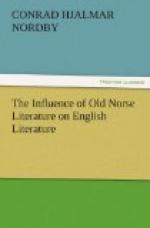That original state was certainly one of original sin, if these poems are to be believed. Every page in this volume is drenched with blood, and from this book, as from Gray’s poems and the other Old Norse imitations of the time, a picture of fierceness and fearfulness was the only one possible. Percy intimates in his preface that Icelandic poetry has other tales to tell besides the “Incantation of Hervor,” the “Dying Ode of Regner Lodbrog,” the “Ransome of Egill the Scald,” and the “Funeral Song of Hacon,” which are here set down; he offers the “Complaint of Harold” as a slight indication that the old poets left “behind them many pieces on the gentler subjects of love or friendship.” But the time had not come for the presentation of those pieces.
All of these translations were from the Latin versions extant in Percy’s time. This volume copied Hickes’s translation of “Hervor’s Incantation” modified in a few particulars, and like that one, the other translations in this volume were in prose. The work is done as well as possible, and it remained for later scholars to point out errors in translation. The negative contractions in Icelandic were as yet unfamiliar, and so, as Walter Scott pointed out (in Edin. Rev., Oct., 1806), Percy made Regner Lodbrog say, “The pleasure of that day (of battle, p. 34 in this Five Pieces) was like having a fair virgin placed beside one in the bed,” and “The pleasure of that day was like kissing a young widow at the highest seat of the table,” when the poet really made the contrary statement.
Of course, the value of this book depends upon the view that is taken of it. Intrinsically, as literature, it is well-nigh valueless. It indicates to us, however, a constantly growing interest in the literature it reveals, and it undoubtedly directed the attention of the poets of the succeeding generation to a field rich in romantic possibilities. That no great work was then created out of this material was not due to neglect. As we shall see, many puny poets strove to breathe life into these bones, but the divine power was not in the poets. Some who were not poets had yet the insight to feel the value of this ancient literature, and they made known the facts concerning it. It seems a mechanical and unpromising way to have great poetry written, this calling out, “New Lamps for Old.” Yet it is on record that great poems have been written at just such instigation.
THOMAS WARTON (1728-1790).
Historians[10] of Romanticism have marked Warton’s History of English Poetry as one of the forces that made for the new idea in literature. This record of a past which, though out of favor, was immeasurably superior to the time of its historian, spread new views concerning the poetic art among the rising generation, and suggested new subjects as well as new treatments of old subjects. We have mentioned the fact that




